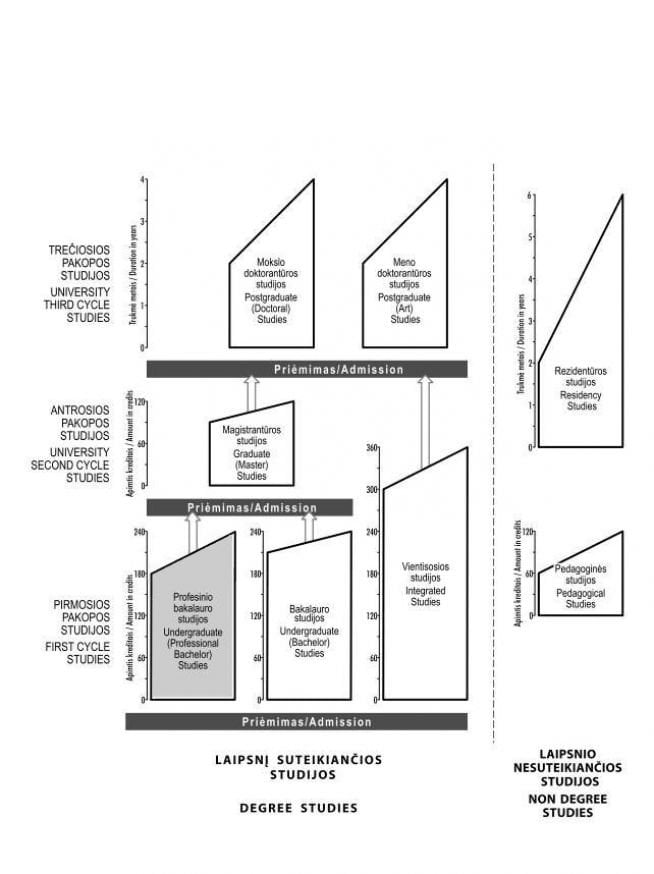Higher education in Lithuania
Higher education in Lithuania
HIGHER EDUCATION INSTITUTIONS
There are two types of higher education institutions in Lithuania: universities and higher education colleges. A university (the name of the institution have to contain the word “universitetas” (university), “akademija” (academy) or “seminarija” (seminary)) carries out university studies, conducts research, experimental development and/or develops high-level professional art. A higher education college (the name of the institution have to contain the word „kolegija” (higher education college) or „aukštoji mokykla” (higher education institution)) provides higher education college studies, develops applied research and/or professional art. Lithuanian higher education institutions are either state or non-state.
STUDIES AT HIGHER EDUCATION INSTITUTIONS
Studies at higher education institutions are carried out according to degree and non-degree study programmes. There are two types of study programmes: university and college.
Degree studies consist of three cycles: the first cycle (undergraduate) – professional bachelor’s and bachelor’s degree studies; the second cycle (graduate) – master’s degree studies; the third cycle (postgraduate) – doctoral studies.
First cycle college study programmes are more oriented towards preparation for professional activity. On completion of these studies, students are awarded a Professional Bachelor’s degree or a Professional Bachelor’s degree and a qualification, which are certified by the Professional Bachelor’s Diploma. First cycle university study programmes provide universal general education, theoretical preparation and professional capacity of the highest level. On completion of these studies, a Bachelor’s degree or a Bachelor’s degree and a qualification are awarded, which are certified by the Bachelor’s Diploma.
Second cycle (Master’s degree) study programmes are designed to prepare for independent research (artistic) work or any other work the performance of which requires scientific knowledge and analytical competence. On completion of Master’s studies, students are awarded a Master’s degree or a Master’s degree and qualification certified by the Master’s Diploma. On completion of theological study programmes of the second cycle persons may be awarded, after consultation with the Catholic church hierarchy,a degree of Licentiate in Theology which is certified by the Master’s Diploma.
Integrated studies combine first and second cycle university studies. On completion of integrated studies, a Master’s degree is obtained and a Master’s Diploma is awarded.
Third cycle (doctoral) studies may be in the field of academic research or arts. On completion of doctoral studies and after defence of a dissertation (art project), a research doctoral degree or a doctoral degree in arts is awarded and is certified by the Doctor’s Diploma.
Higher education institutions may deliver joint degree programmes on completion of which a joint degree is awarded; they also may carry out study programmes so that graduates receive a double degree.
Non-degree studies allow a person to acquire a qualification or to prepare for independent professional activity. On completion of these studies, an appropriate certificate is issued.
Residency studies are studies provided according to non-degree study programmes; such studies are intended for persons who have acquired university higher education to prepare for independent practical activity in the manner prescribed by legal acts. On completion of these studies, a certificate of residency is issued.
Pedagogical studies according to non-degree study programmes are intended to acquire a pedagogical qualification. These studies may admit persons who have acquired a higher education qualification and wish to qualify as teachers of a subject (subjects) or vocational teachers. Upon completion of these studies, a teacher qualification is awarded which is certified by a study certificate.
In Lithuania, a national system of quality assurance in higher education is in place. Only accredited study programmes are carried out. An accredited study programme is entered in the Register of Study and Training Programmes and Qualifications for a fixed period of time.
The extent of studies is calculated in credits. A study credit is a unit for measuring the scope of studies, equaling forty work (lectures, laboratory, individual study and etc.) hours of a student, i.e., one week of his/her work. One study credit is equal to one European Credit Transfer and Accumulation System (ECTS) credit.
The mode of study can be full-time and part-time. Irrespective of the study mode on the basis of which the same study programme has been completed, the acquired education in both cases is equivalent.
ADMISSION TO HIGHER EDUCATION INSTITUTIONS
Study programmes of the first cycle (undergraduate) and integrated study programmes admit by competition persons with at least secondary or corresponding education.
To be admitted by competition to second cycle (graduate) studies, a person must have obtained a Bachelor’s or Professional Bachelor’s degree or a corresponding qualification of higher education, and meet requirements set by the accepting higher education institution.
Admission by competition to third cycle (postgraduate) studies is possible for individuals who have been awarded either a Master’s degree or a corresponding qualification of higher education in the selected study field.
LITHUANIAN HIGHER EDUCATION SYSTEM
